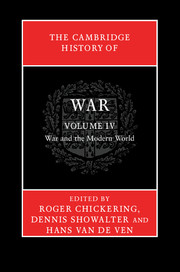Book contents
- Frontmatter
- Contents
- Illustrations
- Maps
- Notes on contributors
- Introduction to volume IV
- Part I The industrialization of warfare, 1850–1914
- Part II The Era of Total War, 1914–1945
- Part III Post-total warfare, 1945–2005
- 17 Military occupations, 1945–1955
- 18 The wars after the war, 1945–1954
- 19 Weapons technology in the two nuclear ages
- 20 Conventional war, 1945–1990
- 21 Wars of decolonization, 1945–1975
- 22 War and memory since 1945
- 23 The era of American hegemony, 1989–2005
- Select bibliography
- Index
- References
17 - Military occupations, 1945–1955
from Part III - Post-total warfare, 1945–2005
Published online by Cambridge University Press: 05 December 2012
- Frontmatter
- Contents
- Illustrations
- Maps
- Notes on contributors
- Introduction to volume IV
- Part I The industrialization of warfare, 1850–1914
- Part II The Era of Total War, 1914–1945
- Part III Post-total warfare, 1945–2005
- 17 Military occupations, 1945–1955
- 18 The wars after the war, 1945–1954
- 19 Weapons technology in the two nuclear ages
- 20 Conventional war, 1945–1990
- 21 Wars of decolonization, 1945–1975
- 22 War and memory since 1945
- 23 The era of American hegemony, 1989–2005
- Select bibliography
- Index
- References
Summary
“Occupation” in the context of World War II comes close to defying definition. In its narrow context, it refers to the involuntary control of a state’s territory by a foreign power. With specific reference to the victorious Allies, it began in 1943 in Italy and lasted through 1951 in Japan. Occupation in the era of World War II was, however, characterized by nuances and ramifications that are sufficient to sustain an analysis based on comparative case studies, as opposed to a general overview.
Occupation as a concept is almost as old as war itself and only slightly younger than the idea of decisive victory. Historically, winners have taken over losers for four major reasons. One is dispossession, the intention to dominate, displace, and replace the original inhabitants – more or less in that order. David Day is correct in stating that “supplanting” is a universal process. Everybody’s ancestors originally came from somewhere else and acquired their “homelands” by some form of force majeure.
Occupation’s second justification has been security. This goal could involve collecting indemnities, as in the case of the Franco-German War. It could involve making sure that a new, friendly government was firmly in place, as in France after the Hundred Days. It could involve establishing a civic order acceptable to the occupiers, as in the former confederacy between 1865 and 1876. The common denominator among these measures was remaining in control of a defeated enemy until that defeat was recognized.
- Type
- Chapter
- Information
- The Cambridge History of War , pp. 428 - 451Publisher: Cambridge University PressPrint publication year: 2012

